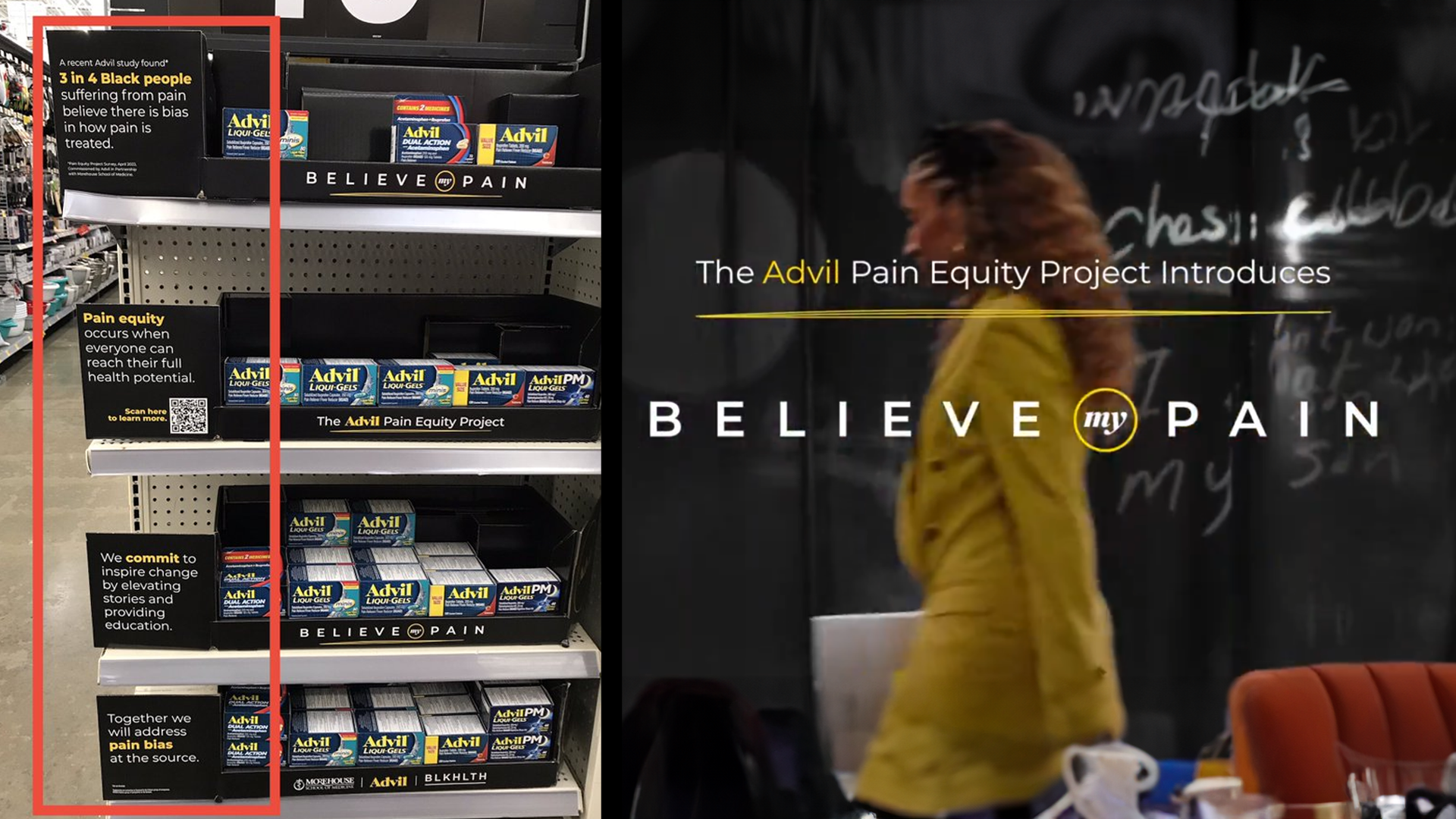A resurfaced ad for a prominent painkiller brand has sparked outrage for calling out racial bias in healthcare. The Advil Pain Equity Project dropped last year to shed light on “pain inequity” and how it impacts Black communities.
The YouTube series, titled Believe My Pain, was produced in partnership with The Morehouse School of Medicine based in Atlanta, and the non-profit BLKHLTH, dedicated to “creating a space for critical conversations about racism, health, and new ways forward,” and consists of several videos of visible minorities recounting their experiences with medical professionals.
One video introducing the campaign begins with a Black man expressing his frustration with the healthcare system: “When I approach a medical professional, I’m frustrated that we have to validate our pain just to get treated like human beings.”
Continuing, a text overlay cites statistics from a study conducted by Advil about “pain experiences,” which concluded that “74% of black people said there is bias in how pain is diagnosed and treated.” The study surveyed “2,000 Americans about their experiences when seeking pain care and treatment” and found the results from “Black individuals to be “significant.”
Another black woman highlighted in the video admitted that while the “healing of the body was easy for [her], she had a difficult time overcoming the “psychological part” of seeking help to deal with her health issues.
In addition to featuring individual stories, the series hosted a roundtable unpacking what the painkiller company describes as “systemic bias in healthcare.” The discussion was hosted by Elaine Welteroth, an American journalist and TV host, and covered several topics, including the “reality of pain inequity.”
Included among the participants was Dr. Uché Blackstock, a physician and expert on racial bias in healthcare. According to her, physicians believe that Black people are different from other people.
Responding to Welteroth’s question about debunking health care myths about the black community, Blackstock said: “So, I think the main thing is that health professionals believe Black people are biologically different than other people, that our skin is thicker than other people, that we have less sensitive skin, and higher pain tolerance. And that is all absolutely false. There is no difference between Black patients and patients of other races, she added.”
Pointing to the legacy of slavery in America as being the reason these misconceptions about black people are prevalent in healthcare today, she added: “I think interpersonal and systemic racism still exists in this country, and that is embedded into the institution of medicine and healthcare.”
Although Blackstock admits she believes most medical professionals want to do a good job for their patients, she stresses that some physicians do not listen to their Black patients because implicit bias still exists.
Resurfaced clips of the roundtable were met with mockery on X by many who were shocked the campaign isn’t satire.
A lot of people think this has to be fake. Unfortunately, this is 100% real. https://t.co/MGPKIl35IJ
— End Wokeness (@EndWokeness) March 14, 2024
“Pain is racist, according to Advil. Imagine being this out of touch with reality,” wrote cultural commentator by the handle @iamyesyouareno.
Pain is racist, according to Advil.
— iamyesyouareno (@iamyesyouareno) March 15, 2024
Imagine being this out of touch with reality. pic.twitter.com/akLutYQ8Zs
Others, calling for a boycott, likened the campaign to the Bud Lite controversy after transgender TikToker Dylan Mulvaney posted a photo drinking their beer last year:
Just when you think WOKE corporations can't possibly get more insane, Advil comes out with a pain equity campaign because pain is racist 🤣🤣🤣🤣🤣🤣
— Vince Langman (@LangmanVince) March 15, 2024
Let's Bud Light these 🤡 👇 pic.twitter.com/d6mFtj9LQd
In addition to the video series, images of Advil’s in-store display promoting the campaign also sparked outrage on X: “WTF is this?! Advil is Promoting Black Pain Bias… I’d say this is peak clown world, but it will be topped tomorrow. I know I’ll never buy Advil again,” wrote one user by the handle @V_its_me_.
WTF is this?!
— ꧁🍃🌸Ɣ🌸🍃꧂ (@V_its_me_) March 15, 2024
Advil is Promoting Black Pain Bias..
I'd say this is peak clown world, but it will be topped tomorrow. I know I'll never buy Advil again.https://t.co/z9KVrqahbp pic.twitter.com/7WTSxkIsu6
In addition to listing its initiatives on how it plans to combat “pain equity,” the campaign website links to dozens of resources encouraging people and healthcare professionals to get involved in Advil’s fight to overcome bias and achieve pain equity in medicine.







